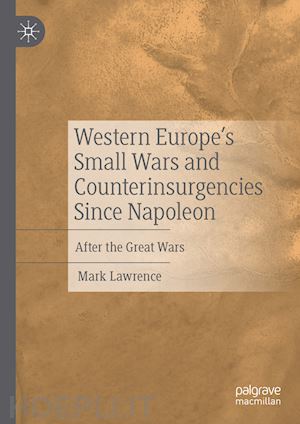

Questo prodotto usufruisce delle SPEDIZIONI GRATIS
selezionando l'opzione Corriere Veloce in fase di ordine.
Pagabile anche con Carta della cultura giovani e del merito, 18App Bonus Cultura e Carta del Docente
This book focuses on the wars that are normally relegated to the periphery of geo-politics at the heart of Europe’s 'new' military history. The military history of the past two centuries of European history has tended to be viewed in the shadow of total war. The impact and aftermath of the French upheaval of 1792-1815, the mid-century struggles for national unification, the World Wars of 1914-18 and 1939-45, and the prospect of mutually assured destruction in the Cold War, were all framed as a totalization of warfare and as a tragic pretext for projects of human rights, collective security, and political integration. But this emphasis on large wars overlooks the impact of the wars waged by minor powers as well as the small wars and counterinsurgencies waged by great powers overseas. The suppression of southern European revolutions in the 1820s, Belgian independence, Cuban struggles against Spanish rule, and the wars of new imperialism ranging from Aceh to Annual, all shaped the strategic and domestic environment in which the Great War happened, and they reverberated on the post-1918 growth of totalitarianism. Equally the post-1945 wars of decolonization militarized the culture and politics in the democratic and authoritarian states of the old continent, in ways which belied the macro-political identities of the Cold War.
1. Introduction.- 2. Small Wars in Big Peace, c.1815-1849.- 3. Small Wars, Big Empires and Big Technology, c.1850-1914.- 4. Small Wars in Collective Security, 1919-1939.- 5. Western Europe’s Small Wars During the Cold War.
Mark Lawrence is Senior Lecturer in Military History at the University of Kent, UK.











Il sito utilizza cookie ed altri strumenti di tracciamento che raccolgono informazioni dal dispositivo dell’utente. Oltre ai cookie tecnici ed analitici aggregati, strettamente necessari per il funzionamento di questo sito web, previo consenso dell’utente possono essere installati cookie di profilazione e marketing e cookie dei social media. Cliccando su “Accetto tutti i cookie” saranno attivate tutte le categorie di cookie. Per accettare solo deterninate categorie di cookie, cliccare invece su “Impostazioni cookie”. Chiudendo il banner o continuando a navigare saranno installati solo cookie tecnici. Per maggiori dettagli, consultare la Cookie Policy.